This post may contain affiliate links.
When we decided to change RVs and buy another used motorhome – an older diesel – we knew we wanted to get a professional pre-purchase RV inspection done first, before signing on the dotted line. It ended up being a wise decision that saved us a lot of money. In this video and blog post, we share our RV pre-purchase inspection experience. And why we think it’s worth spending the money having a 3rd-party professional do an RV inspection before you buy.
Our decision to buy a new coach
Our decision to change our motorhome was not one we made lightly. After all, our RV isn’t just something we take out on weekends. It’s our home and our office too! We had been casually considering changing RVs for about a year. We dove into serious RV shopping a few months before we found our 1999 Country Coach Intrigue. A coach like this certainly isn’t for everyone.
Buying an RV is always a very individual decision. So we guinea-pigged ourselves by applying everything we have learned over the years (and teach in our RV Success School) It helped us narrow down to the kind of RV we felt would help us best meet our needs and goals in this next phase of our life.
We narrowed our list of ‘must haves’, and other features important to our specific needs and lifestyle. And we were very clear on what our next coach needed, to make it the right fit for US. Being crystal clear on your own unique needs, values and preferences will help immensely during your RV shopping and purchasing process.
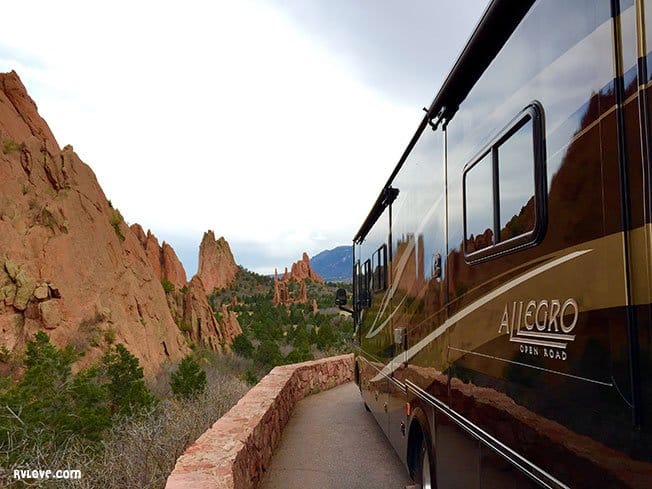
Now, before we dive into the inspection experience of our 1999 Country Coach Intrigue “CC”, we have a confession to make.
Our Confession
As RV newbies back in 2014, we did NOT get a pre-purchase RV inspection on our 2012 Tiffin Allegro Open Road motorhome. Why not? Well, as we said, we were RV newbies (obviously, this is even MORE of a reason to get an RV inspection pre-purchase). But we simply didn’t know what we didn’t know at that time!
After several conversations with the private seller, I flew out to Ohio to inspect the Tiffin and take it for a test drive. It drove great, was in excellent condition, and everything we had hoped for. The RV was only 2 years old, had just 23,000 miles, AND came with an extended service contract. We were even able to transfer the extended service contract into our names. This was definitely a huge bonus that we put to good use and saved us thousands over the next 3.5 years. We figured we didn’t really need to spend the money on a professional inspection.
There was nothing obviously wrong with the coach, so we proceeded with the purchase. On our maiden voyage from Ohio to Colorado, I detected the smell of propane. As it turned out, we had a propane leak, resulting in the need to replace one of the furnaces plus a leaky hose. Fortunately, this repair was covered under our extended service contract. But we still had to pay the $500 deductible (the total repair was about $1,800). It definitely would have been good to know about this in advance. A professional RV inspector may have been able to detect this ahead of time. And the issue could have been repaired before we took delivery, but I digress. Back to CC’s inspection.
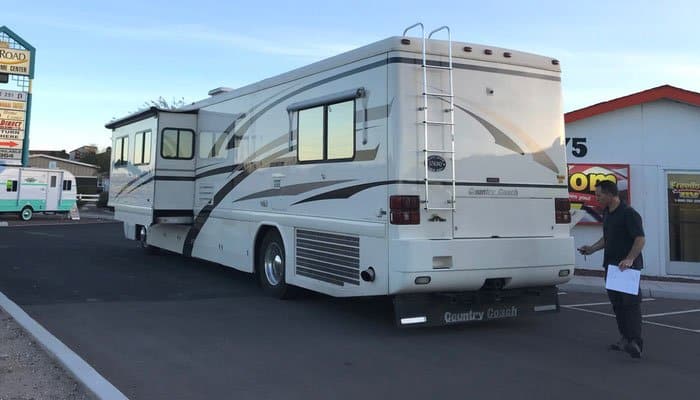
Why we wanted a professional RV Inspection
We consider ourselves experienced RVers who understand the most important things to look for when RV shopping. But we are not mechanics or engineers, and we’re certainly not trained or qualified to do professional RV inspections. There are SO many components and structural aspects of an RV to take into account. And it would be near impossible for us to check them all thoroughly without proper equipment.
Any time you’re buying an RV – whether new or used – you’re still taking a risk. Will it will be reliable, go the distance with you and not end up costing you in terms of unexpected or costly issues and repairs? We’re firm believers that anything and everything you can do to help manage that risk, is a wise move.
Of course, we did our own initial inspections of CC. But also knew we wanted a much more thorough independent 3rd-party inspection to test all systems on the coach before purchase. We wanted an unbiased and even more skilled professional to conduct an inspection who could be more objective. We were already in love with CC. A third party is more likely to catch things that we might miss during our own inspections.
Benefits to purchase process
Even though this particular RV was much less expensive than others we had been looking at, it is still quite a chunk of money. With so many things that can go wrong with an RV, we knew it was important that we make a good decision on our purchase. A professional inspection can highlight potential issues in advance. This knowledge can save you money when negotiating a purchase price, or may even help you avoid buying a lemon.
Ultimately, it will give you peace of mind in knowing exactly what you are buying and what to expect to reduce the risk of ‘surprises’ down the road. In fact, one of our RVing friends, shared how much he valued having a professional inspection on his one year old RV. It was required in order to take out an extended service contract. He learned so much more from the Inspector about his RV, systems and recommended maintenance during the process.
Scheduling Our RV Inspection
We felt ready to buy and were keen to get the inspection done and finalize the transaction as soon as possible. We chose Premier RV Inspections, as they have an excellent reputation, and a network of qualified inspectors around the country.
The online scheduling process was simple and easy, and we were able to schedule our inspection in Tucson just a few days later. We also liked that Premier RV Inspections also works very closely with Wholesale Warranties – another company we know and trust. In fact, getting quotes for extended service contracts (warranties) on certain RVs on our short-list was part of our shopping and research process. Depending on the unit, warranty prices can vary widely. This definitely impacted some of our decision making when RV shopping.
RV inspectors are mobile and will come to where the RV is located. But you might not be able to be present during the inspection.
Preparing for your RV Inspection
A few things you will need to have available for your inspection:
- Ensure the RV is unlocked and plugged into electricity and water (or at least fill your fresh water tank)
- Turn on the fridge at least 4 hours before the inspection (preferably overnight)
- Allow about 2-3 hours for the inspection
What is included in an RV Inspection?
The RV inspection will vary depending on the type of RV you are buying. For both motorized and towables, they will inspect the exterior of the RV, mechanicals and the most costly components, including:
- External Condition (body, rust, damage, paint, decals, windows, slide out seals, glass etc)
- Tires and Batteries
- 120 Volt Systems and Appliances (Air conditioners, residential fridge, microwave etc)
- Slide room operation
- Generator
- LP Propane and Gas Systems and Appliances (fridge, furnace, range burners etc)
- Fresh Water and Holding Tanks / Draining System
- Audio, Video, TV, Satellite etc
- Other electrical appliances (washer/dryer, dishwasher etc)
- Photos of RV, especially those detailing areas of concern
The inspector completes a written report, which you will get a copy of within a couple of days of the completed inspection.
If you’re buying a motorhome, as we were, the inspector will also check:
- RV fluid levels, such as engine oil, coolant, power steering, transmission fluid, brakes etc
- Engine, Transmission, and Cruise Control (operation, vibrations, slipping abnormalities), Dash Gauges, Dash A/C, Audio visual etc
- Braking and Suspension systems
They will also do a test drive of the motorhome (generally as a passenger) to check for unusual sounds, vibrations or noticeable defects. The inspector will not only inspect but also educate you about the condition of the RV.
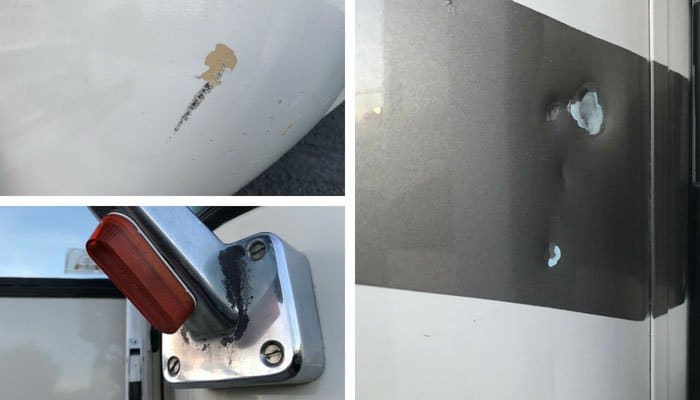
RV Inspection Day
I arrived a couple hours earlier than the scheduled appointment time to do my own pre-inspection and build a list of items to discuss with the inspector upon arrival. During my initial walk around I noted that the tires were different sizes than original equipment on the RV. There was also a big chunk missing from one, and the rear tires looked old. I was unable to find the date code as the tires had been mounted with the date codes facing in.
The plumbing system and most of the appliances were working. But I wasn’t sure if they were working optimally. I had also spotted some water damage behind the fridge and there was some surface rust in areas. But the engine compartment was nice and clean. There was some paint peeling and checking and plenty of cosmetic imperfections. This was to be expected, given the age of the coach. That didn’t concern me, I was more focused on the mechanicals and systems and looked forward to hearing what the inspector would find when he arrived.
Inspector arrives
Once our inspector, Eric, arrived, he did an initial inspection of the exterior of the coach including the tires, batteries, engine bay, storage areas, and generator. It was definitely a bonus that Eric was very familiar with Country Coach. He had worked for the manufacturer and owns one himself!
Watch the video to see the high level points of our RV inspection. Note, fortunately, we were able to be present during the inspection. But, depending on the inspector, you might not be allowed to be present.
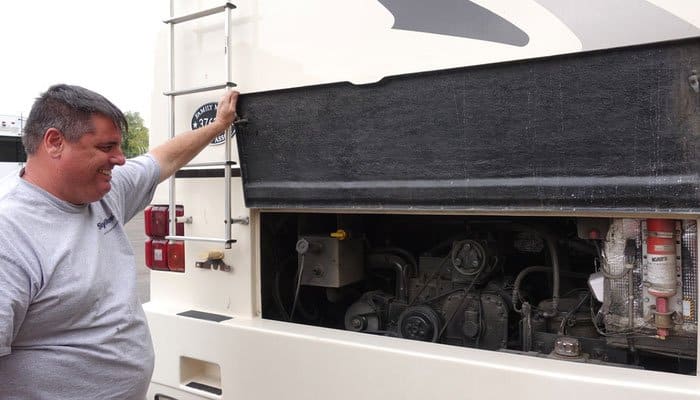
After our initial exterior inspection, we went inside to test the electrical, propane and plumbing systems. We tested all appliances and fixtures. There are so many things to test in modern RVs, especially motorized ones. It is like doing a car inspection and a home inspection at the same time.
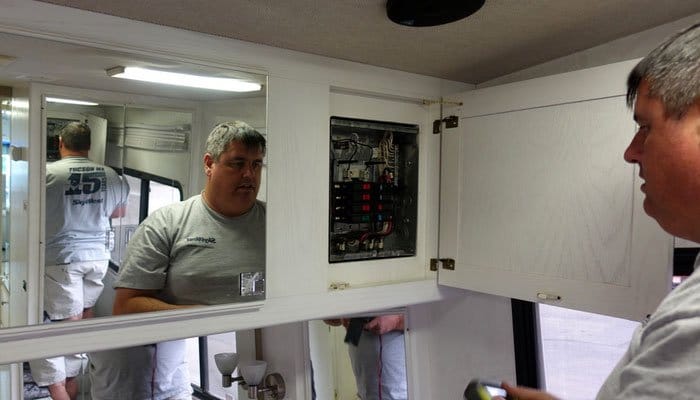
Even though it was a hot day, we still checked the heat pumps and furnace. We tested every light, and every function of all appliances. Not just to see if they worked, but also using diagnostic tools to ensure they were working properly. We tested the slide movement. And inspected the ceiling and inside cabinets for any signs of water damage or other potential concerns.
Eric drove the coach to test the engine, transmission, steering and braking systems and ensure they were operating as they should. The road test confirmed some of our expectations from the larger sized tires, as you’ll see in the video.
Of course, if you’re buying a non-motorized RV, the inspection won’t include a road test.
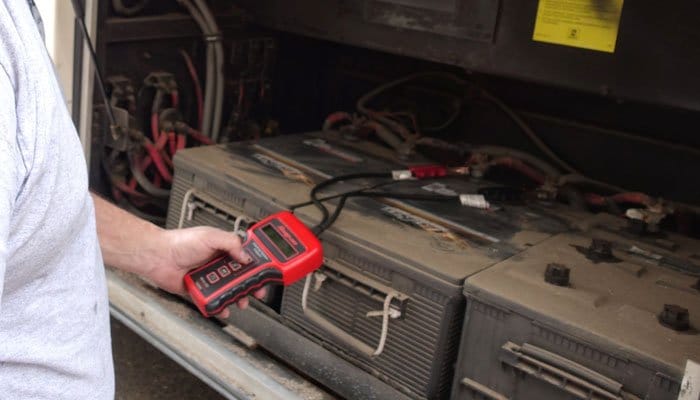
What Issues Did We Find?
As expected, during our inspection process we uncovered a number of issues that needed to be addressed. Based on Eric’s feedback, we were also able to establish a priority list for repair.
Here is a summary of the items we knew we needed to action fairly quickly:
- Replace all six tires (poor condition, uneven, different sizes, types and ages)
- Service engine (change oil and filters etc)
- Replace the waste tank blade valves (leaking tank)
- Install new engine belts (showing signs of cracking)
- Replace the chassis and house batteries (working but old and wrong type)
- Remove the water damaged flooring under the RV fridge (when upgrading to a residential fridge)
- Replace inverter for house electrical system (not working)

It felt really good to be armed with detailed information on the specific items that needed to be repaired and how soon. This allowed us to plan and budget for future repairs. It also became a powerful negotiating tool when it came down to agreeing on a purchase price with the seller (dealer).
Some people might choose to negotiate for the seller to remedy the issues prior to taking delivery. We opted instead to negotiate the price down and arrange to do the repairs ourselves. Of course, the best path for you might be different depending on your time, skills, and level of interest in DIY RV repairs.
Issues Found Brought Us Huge Savings
We are confident that the knowledge we gained during the RV inspection gave us the clarity and confidence to negotiate the purchase price down substantially. The price you pay for an RV inspection can pay for itself many times over. It certainly did in our case. We ended up negotiating an additional $10,000 off the already discounted ‘internet sale price’ of $35K. In the end, we bought our CC for just $25K. Score!
And as soon as I drove CC off the lot, I headed straight to the tire shop to get some new shoes for CC. I also took it to a shop for engine and chassis service. Keep an eye out for our next video where we cover our first set of ‘fixes’.
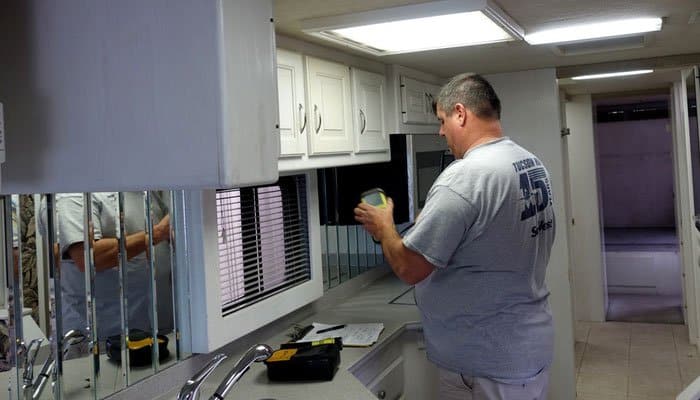
What's Next?
As you may know, we have been planning to do a significant renovation of the RV interior once we have had a chance to live with it ‘as is’ for a few months and work out what we want to do. Some of the other smaller concerns identified with the interior – like peeling paint or loose fixtures – will be addressed during our upcoming RV makeover / renovation (See our Ultimate Makeover Series here) . The most important things to us from the beginning were ensuring mechanical safety and road worthiness. The cosmetic stuff we can deal with for a while.
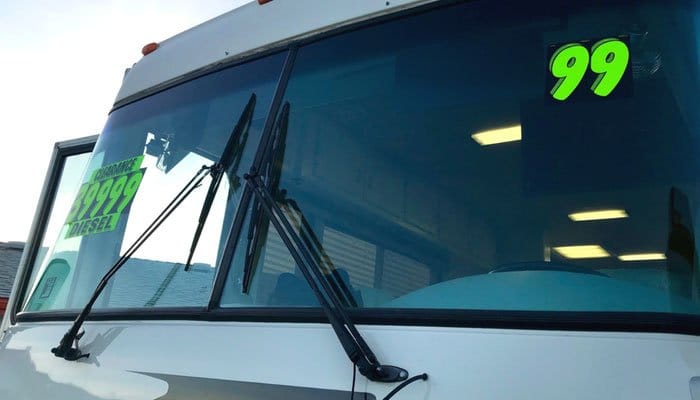
Do You Really Need a Professional RV Inspection?
In our opinion, whether you’re buying from a dealer or privately, knowing what you are getting into in advance can save you in many ways – repairs, time, money and headaches. When you know exactly what you’re getting into, it helps you make an informed decision, gives you confidence in the purchase, and can significantly reduce the chance of nasty (or expensive) surprises down the road. If any issues are identified, you can either choose not to proceed with the purchase (and save yourself an expensive mistake by avoiding buying a lemon), request certain repairs be made before taking delivery, or use that inspection report and “fixit list” to negotiate an even better price (as we did).
When you’re selling your RV, having an independent written inspection report will also show prospective buyers the RV is in the condition as advertised. Finally, if you’re considering taking out an extended service contract (also known as an extended warranty) you will need to have the RV fully inspected before they will offer you coverage of your used RV anyway. These are not needed at the time of buying a new RV. Even if you are buying from an RV dealership (as we did), their walk-throughs are usually not very thorough or in-depth. So having an independent, unbiased, 3rd party review of the RV will give you more certainty and peace of mind. You’re not just believing what the salesperson tells you!
Our experience
All in all, we had a positive experience and are glad we had a professional RV inspection before we bought our RV. It’s one of those things that so many people try to save money on. But at the end of the day, you may end up spending more in the long run, fixing issues you may not have been aware of.
This is especially likely if you are a newbie or don’t have a lot of RV experience. But even as experienced full-time RVers, we absolutely recognize the value in it.
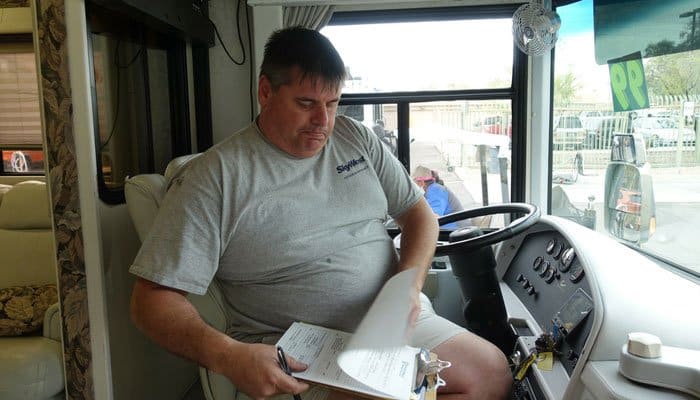
What Does an RV Inspection Cost?
You will pay around $400-$450 for professional RV inspection for a motorhome. Towable RV inspections are almost always less expensive as they are much simpler, with no need to test the engine and related mechanicals. An RV pre-purchase inspection is an investment that can literally save you thousands and bring a lot of peace of mind with it…. or it can help you avoid buying a lemon.
If you are shopping around for an RV, we highly recommend getting a professional, independent inspection from a qualified technician before buying. We also recommend getting a quote on an extended service contract to consider as part of your total RV purchase cost, as these prices can vary widely, depending on the type, age and mileage of the unit.
That’s one of the benefits of organizing an inspection through Premier RV Inspections . Getting a completed inspection through their company is also a prerequisite for obtaining extended service contract (warranty) coverage through Wholesale Warranties which is the company we recommend most often. They offer the widest range of policies, the best pricing and excellent service.
Below you will find some links to these companies, which we know and trust through personal experience.
Useful Links
RV Inspections: Visit Premier RV Inspections or call 855-819-1777 to find an inspector near you
Extended Service Contracts (Warranties): Visit Wholesale Warranties or call 800-939-2806 to get a quote
Sign up for our email newsletter with the latest RV park reviews, news and updates.
GOT COMMENTS OR QUESTIONS?
Are you shopping around for an RV? Have you had a professional RV inspection? We’d love to hear from you in t he comments below.
Related Content
Want to check out more related content? Hover over each image to see the title name.
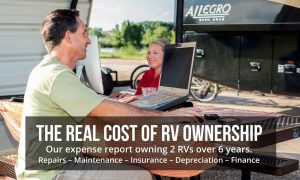
The Real Cost of RV Ownership. Here’s What We Spent.

RV Extended Warranties. Are They Worth it? 2024 Update

Episode 2: What Are We Going To Do? Ultimate RV Makeover

Episode 1: Let’s Do This! Ultimate RV Makeover Series

Get a Sneak Peek | Ultimate RV Makeover Series

RV Shakedown: First Boondocking trip and Upgrades

Getting a Professional RV Inspection Before Buying

Why Did We Buy an Older RV?

How Much Does It Cost To Travel In An RV?
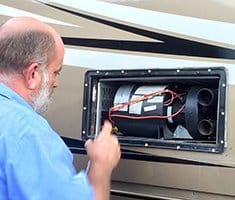

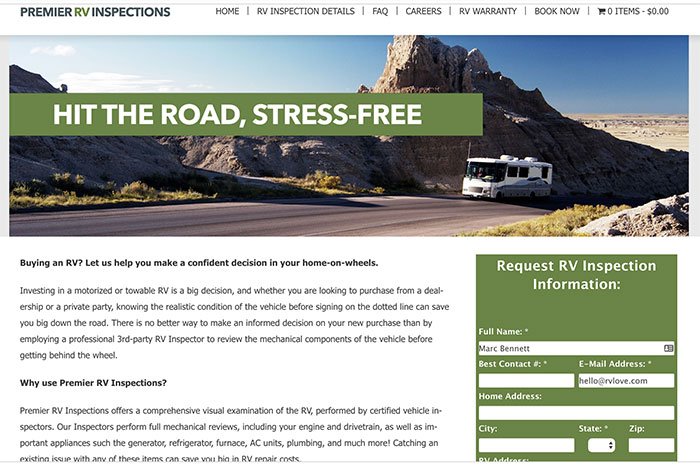
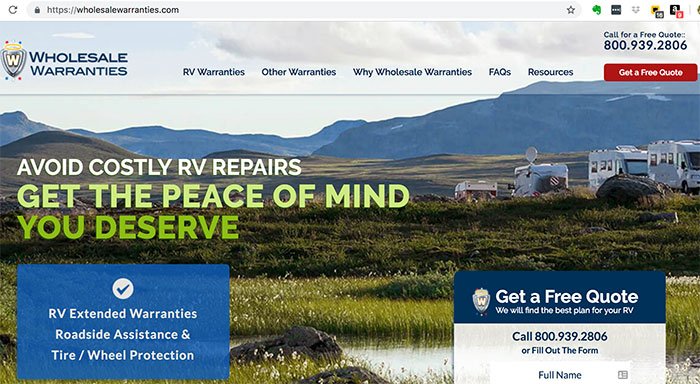
34 thoughts on “Getting a Professional RV Inspection Before Buying”
It made sense to me when you said that a professional RV inspector could be able to detect possible repairs ahead of time. My husband is planning to purchase an RV so we can have something to use on our family trips. I will ask him to consider having it inspected to ensure that all its appliances are working fine and in a good condition.
That is a very wise move! A professional inspector will know what to look for – including the things you can’t see. Also, if you are considering getting an extended RV warranty for peace of mind, know that as part of that process, the warranty company will send an inspector out to view the rig. Here is our article about that – to help you decide if it is for you or not. https://rvlove.com/planning/rv-extended-warranties-are-they-worth-it-3 – good luck!
2021 affiliate link update:
Not only does Premier RV Inspections not encourage a prospective buyer be present at the inspection, they don’t allow it according to the response I got.
“While this RV inspection can be a great tool when purchasing an RV, it is important to note that the Premier RV Inspector is not responsible for providing a walk-through, guidance, or any additional RV information to the potential purchaser of the vehicle. As such, the buyer of the RV will not be permitted to attend the inspection. For details about how to operate the RV or other questions specific to the unit, we recommend you work with the vehicle seller directly.”
Wow, that is news to us! We will look into further – thanks for the heads up! We recently had an inspection on our Casita to get an extended warranty, and were (had to be) present. So I am surprised to think a potential buyer may not be able to be present during the inspection. I’ll see what I can find out and come back to update this comment – and the post if need be . Thanks again!
Update. We checked with our contacts, and unfortunately customers are no longer able to be present during the inspection. From what we understand, some customers were asking too many questions and expecting the inspectors to walk through all elements of the RV, which was taking too long for the inspectors. So, they needed to implement a change to their policy.
I just looked at their website. For liability reasons, they do not check the roof!!!!
That is very surprising that they would not check the roof. -M
Takes 8 hours minimum to perform an NRVIA inspection on a class A .. fluid analysis needs to be performed also
Yes, a thorough inspection of a modern Class A could easily take a whole day. -M
I agree with getting a professional RV inspection done especially if you are buying used. My first three RVs were new and came with more problems than my used one YIKES! But, I do know what to look for on my own except for the electrical or mechanical things. Educating yourself and really giving the RV a through look through even asking for a 30 day warranty. At Lazy Days in Tampa they let you spend the night after purchase and then fix all your issues while your there.
Yes it is money well spent! And agree – many used RVs can be better than new as they have ‘already had the bugs worked out’! Most decent RV dealerships should allow you to spend time on site in the RV to familiarize yourself before driving off. People should always ask! For more complex units, you can often stay a few days or more. Always better to get your RV issues fixed before you leave the dealership as you will ALWAYS find something! All the best to you!
Dixie Rv offers the same thing.
Spend the night in your new Rv and they will take care of any issues the next day.
That is, If you happen to find any problems. lssues like WORKMANSHIP and other other problems usually show up later on down the road.
Happy Trails !
Many good RV dealers will allow you to stay a few days, as many fixes can’t be done in just a day. Beware if they try to rush you out! And yes, good idea to make a follow up service appointment before you even leave, as you are bund to have some issues come up down the road, and you don’t want to wait until last minute to make an appointment or you could be waiting months. Fall and spring usually the busiest times, and expect this year will be especially busy with all the new RVers out there! Safe travels!
We just purchased a 2004 Gulf Stream Conquest (Class C) with only 19,000 miles on it and had the Lemon Squad do our inspection. It was $300 well spent to learn that we were getting as sweet a deal as we did. The inspection report included 98 photos and seemed to cover every single aspect of the rig. We were delighted to learn that this was truly a well cared for and well maintained coach with very little wear and tear. It was money well spent for the peace of mind.
Congratulations! Sounds like you found a great deal, and love hearing that you did an inspection for peace of mind. Safe travels.
Thank you for developing and sharing this video ,it’s very informative. We are very interested in upgrading from a 28ft TT to a motor coach and currently reviewing consumer information while shopping. There’s no question a coach inspection is a must. Currently, we are undecided about Diesel vs Gas engine and there are so many opinions. However the repair costs of a gas engine are less expensive.
Thank you. We are glad you found this video and post so informative. Yes, the great debate of Gas vs Diesel. There are a lot of variables to consider which is best for you. We have had both, and both were right at the time. We offer extra insight into the decision factors in our RV Success School Courses specifically in the course about choosing the right RV for you, but if buying a bundle, we also offer group calls to ask questions. https://rvsuccessschool.teachable.com/ Wishing you the best in your coming coach purchase.
Thank you for this article!!
I will be obtaining a suitability inspection for a retro 70’s Motor Home my son is renovating, in order to get insurance on it.
Your comments were extremely valuable, and we can plan ahead on renovations now with a good priority checklist!
Excellent! Glad to hear it!
Man, your site has answered so many questions that I had esp. the inspection business! I was really sweating that. Now I’m perusing the mattress info and then I will consume the rest of the site. Thanks for the good work and good luck to us all.
Thanks Jami – all the best to you. Feel free to ask if you have any questions. Cheers!
My question is is gas or diesel the better choice
Oh, I wish it was that easy. There are pros and cons to both, and we have recommended one or the other to folks depending on their individual needs. We have had both, and they were both the right coach for us at the time. Our favorite things about our diesel are that it feels more residential, and that the extra engine and braking power make it more pleasant and safer to drive. But gas coaches are might still be a better choice for some people.
Thank you this was wonderful! Learned a lot!
I am ready to take the plunge! I am single and mature and have watched hundreds of YouTube videos including your reno. Beatiful by the way.
My problem is something many may have…so many bad reviews of RV sales centers! There is a huge one with consignments in TX that I am interested in, but bad reviews scare me.
Do you consider those important?
I am sure there are more happy campers so to speak that have not bothered to write good reviews..but you have to listen to the bad ones too.
Plus, I want a no doc loan with a super great FICO score so buying private isn’t an option for me.
Any advice on dealerships and reputations?
Hi there. Yes, bad reviews are common – on many things… especially among RV sales centers. Glad to see you noted that there are also happy campers who haven’t bothered to write good reviews as those are usually the folks out there enjoying themselves while others who have an axe to grind love to write bad reviews, often without sharing the full picture. As with any review, you need to learn how to read in between the lines and pay attention to the reviews that are balanced and reasonable and not those who simply want to whine and be heard. You don’t “have to” listen to the bad reviews but it is important to be discerning when reading them. It is a buyer’s responsibility to do their homework, research, and due diligence before purchasing an RV. Certainly do your research on dealerships. Take a walk around the service center or campground (if they have one) and ask other owners who have purchased there what their experience has been. We have had good experiences dealing with National Indoor RV Centers which has several locations. Visit your local dealers, build a relationship with them, see how they treat you. And remember the sales dept will almost always be amenable up to the purchase. It’s really the service dept – after the sale – that is often most important. Call them and try to “make an appointment” to service your RV (even if you don’t have one yet) and find out how the service is on the phone, how long you will have to wait etc. That will also give you an idea. You can still apply for a “no doc loan” on an RV when buying privately.
Hi Marc and Julie,
thank you for the great information. We are in Colorado and retiring in 2020. We are purchasing a New Jayco Pinnacle fifth wheel. We have already lined up an NRVIA inspector to be present and work with us during our PDI at the dealer. If I have learned nothing from my research during the last 2 yrs; even a new unit will have problems…so best not to sign over your savings before you are pretty certain the obvious problems are corrected.
We take delivery the end of May 2019. Our plans are to travel and get accustomed to the unit before retiring full time in 2020/// BTW my daughter gave your book to us for Christmas 2019. Love it.. and packed full of great information.
See you on the road!
Rick and Stacy
HI there and congrats on your upcoming retirement! Happy to hear you are aware all units have ‘issues’ so best to get the obvious sorted up front if you can. And giving yourselves a year to get accustomed to it and work out the ‘bugs’ is smart. Glad you enjoy the book! May it help you greatly on your journey! Happy Trails!
We purchased a 2015 Thor Miramar from Dixie RV in Hammond in Dec. 2016. Being a new rv’er, I didn’t know what to ask and now, we have a beautiful RV that we don’t use, so we’ve advertised it for sale. One perspective buyer asked me if the unit flooded, due to significant rust along the bottom of the unit compartment. I was not informed of it flooding when it was purchased, it looked and smelled new. Still smells new. But now I’m concerned and even crawled under the unit myself to see if there was any other rust, silt lines, etc… There is! I called Dixie RV and spoke with the Salesmanager who stated any RV that had “significant” flooding was bought by the insurance company. He could not or would not tell me if our unit received any water. We have taken one trip to Austin and back and it’s been sitting here at home. Now, I went out there today to put the leverlers down and it states they need service. Our unit is plugged into a 50 amp plug. The invertor isn’t giving accurate information regarding the amps. And i can’t use the slide outs. I want to have a thorough inspection done, although we purchased it. I don’t feel that the salesman and Salesmanager has been honest with us on this unit.
Has anyone had an after purchase inspection and it help them with getting adequate and proper repairs or replacements? I cannot sell this unit to an unsuspecting buyer and just transfer the problems to them. I don’t want a flooded and rusted out RV either! Help!!
Hi Lillie, you are a very thoughtful seller. While we have not had this experience to be able to offer a solution, I would contact an inspector for their insights. At the very least, selling the RV with a current RV inspection report shows transparency and thoroughness from your end, and then it is the buyer’s responsibility. I hope this helps!
Great article, do you have any reccomendations for inspectors near the Moorpark CA area 93021?
Go to this website http://bit.ly/RVInspection and type in your ZIP to find a local inspector. Good luck!
Would you recommend a professional inspection for buying a new RV? What language would you add to purchase contract to cover inspection/PDI/repairs?
Excellent post, we bought new a year and a half ago, so didn’t feel the need for an inspection (although it could be money well spent to have a professional inspection done just before the end of the first year, and use that inspection to get EVERYTHING fixed at your dealership while under warranty). After seeing this, I would definitely consider getting a thorough professional inspection done before buying anything used, especially a diesel (I’m a retired engineer, and had been very hands on my entire career and I don’t shy away from most home or automotive repairs; that said, I know what I don’t know, and would very much welcome a professional look at the diesel engine, generator, and the automatic transmission sections). I always enjoy your posts!